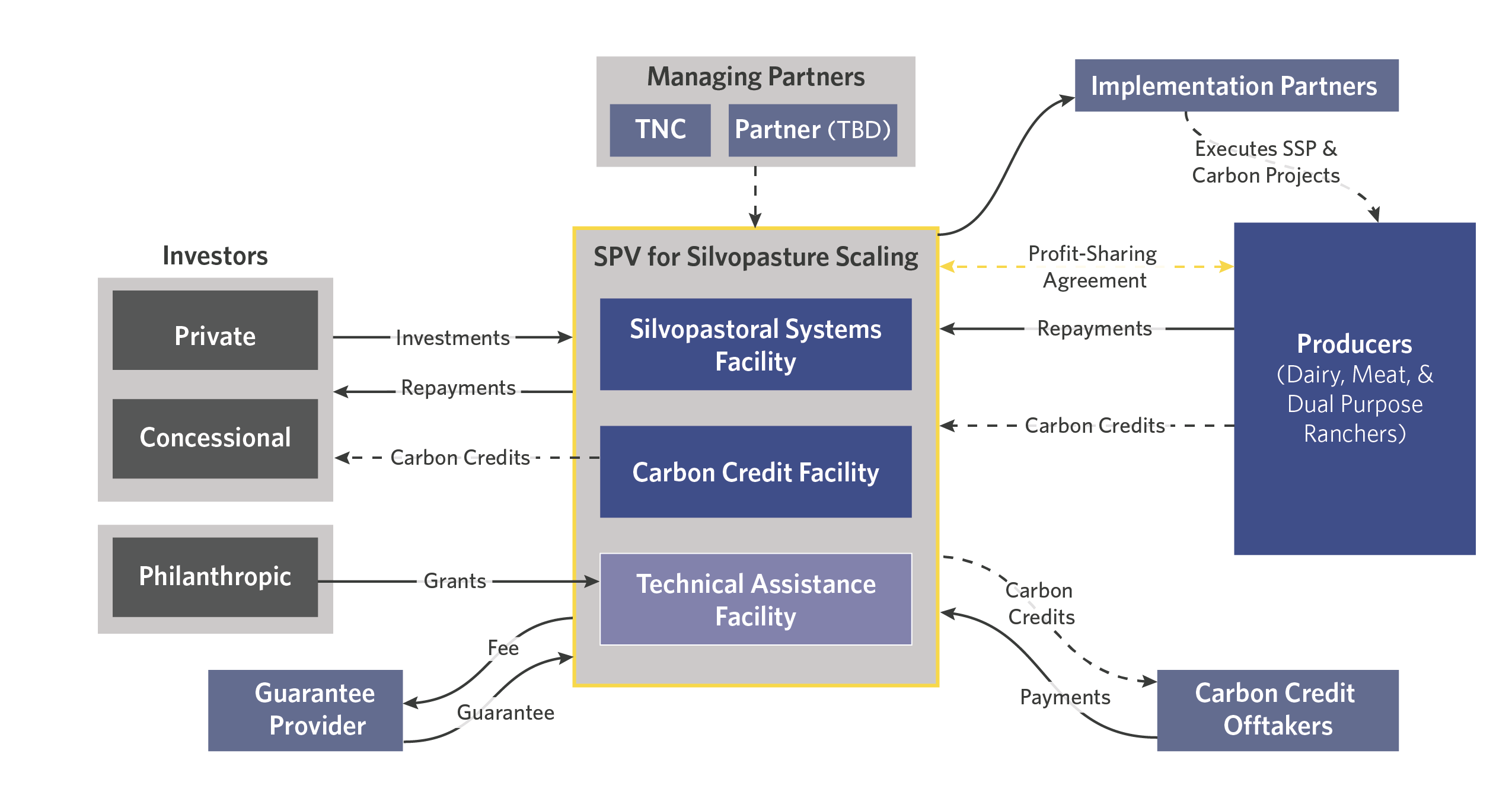This special purpose vehicle (SPV) enables the adoption of more sustainable practices that lead to reduced emissions, increased carbon sequestration, and the recovery of degraded land, and contribute to greater income generation for medium-sized farms and enhanced climate resilience.
ABOUT
The cattle sector is crucial to the livelihoods of Colombian farmers, occupying 80% of the agricultural land and directly employing 800,000+ people. However, conventional ranching is a major source of greenhouse gas emissions, land degradation, and in some cases, deforestation in both the country and broader Latin America region. At the same time, both the sector and region are highly vulnerable to the effects of the increasing intensity and frequency of extreme climate events.
Silvopastoral systems (SPS) are agroforestry arrangements that combine trees, fodders, and grasses for animal nutrition and other uses. Compared to conventional extensive grazing, SPS are a more sustainable approach that contributes to reducing GHG emissions, increasing carbon sequestration, and fostering resilience through its focus on increasing biomass and improving overall ecosystem health (e.g., soil recovery, biodiversity). Significant upfront financing and technical knowledge will be required for the successful implementation and permanent adoption of SPS.
INNOVATION
The SPV is a novel approach for overcoming lack of access to capital, ranchers’ debt aversion, and absence of technical knowledge, leading to successful SPS implementation.
Unlike traditional loan-based models, the SPV employs a profit-sharing approach to finance the initial implementation of the silvopastoral systems, supported by a 5-year technical assistance program. Repayment is thus tied to productivity gains rather than fixed payments.
The instrument is also tied to a grouped carbon project designed to issue high-quality carbon credits, providing ranchers with an additional revenue stream and enhancing the financial sustainability of the vehicle.
THE SOLUTION
SPV for Silvopasture Scaling acts as a market enabler that: 1) attracts impact capital seeking positive environmental and social returns; 2) provides enrolled farmers direct on-farm SPS and restoration implementation with technical assistance, overcoming the capital and knowledge barriers. The SPV is repaid over time through performance-based contracts via a mix of profit-sharing on yield improvements and high-quality carbon credits. The long-term nature of the agreement allows time for SPS to mature and thrive, as well as relieves pressure on the rancher.
“We see participation in the Lab as an opportunity to ensure that the business model for a self-sustainable financial mechanism is solid and able to support the project’s ambitious goals.”
Alicia Calle, R2A Strategy Advisor with the Nature Conservancy
IMPACT
The SPV will mainstream sustainable cattle-ranching practices, aiming to impact 986 mid-sized farms in Colombia, transforming 59,000 hectares of degraded land.
The instrument helps convert degraded pastures into healthier pastures with increased tree cover and improved soil. This will simultaneously improve the quality and diversity of the cattle’s diet reducing methane emissions from their digestion process, and lead to increased carbon sequestration.
The SPS intervention will also contribute to conserving and restoring natural ecosystems and watersheds and enhancing biodiversity by prioritizing the protection of buffer areas that are critical for the stable delivery of ecosystem services. The transformation of the productive system contributes to enhance its resilience to increasingly intense climate events, while improving productivity, reducing costs, and producing high quality of beef and milk products
DESIGN

The SPV will be run jointly by TNC and an experienced managing partner. The partner will establish profit-sharing agreements with farmers, manage the delivery of technical assistance, coordinate SPS implementation, and oversee carbon credit sales.
The SPS Facility will lead the design and implementation of silvopastoral systems. It will structure profit-sharing agreements based on productivity gains achieved through SPS, that will be one revenue source to repay investors.
The Carbon Credit Facility will design and develop a grouped carbon project that aggregates mitigation impacts across participating farms. It will also ensure issuance and sale of the resulting carbon credits.
The Technical Assistance Facility will provide technical support and monitoring of the SPS implementation results. The instrument will target private and concessional investors for the SPS and Carbon Credit Facilities, and philanthropic capital providers for the Technical Assistance Facility.
The vehicle will include a guarantee to mitigate the risk of not materializing productivity gains or not collecting repayments. Additionally, the proponent team is exploring potential partnerships with beef and milk off-takers to ensure the purchase of more sustainable production. Moreover, the instrument will have a concessional capital tranche aimed at improving the return profile for commercial investors.

